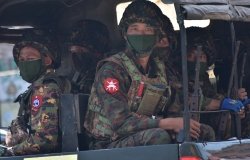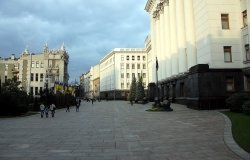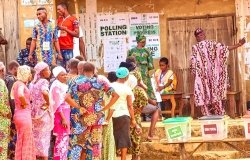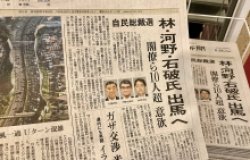Exorcizing the Islamic Ghost Haunting North Africa
The victory of moderate Islamist parties in parliamentary elections, first in Tunisia and now in Morocco, confirms the most significant change wrought so far by the Arab revolts of this past year-- their emergence into the mainstream of Arab politics as leading players. Whether these elections will exorcize the “Islamic ghost” haunting North Africa, Europe, and the United States remains to be seen, but initial signs are mostly promising.
The victory of moderate Islamist parties in parliamentary elections, first in Tunisia and now in Morocco, confirms the most significant change wrought so far by the Arab revolts of this past year-- their emergence into the mainstream of Arab politics as leading players. Whether these elections will exorcize the “Islamic ghost” haunting North Africa, Europe, and the United States remains to be seen, but initial signs are mostly promising.
To appreciate the magnitude of the change taking place in the western portion of the Arab world known as the Maghreb, one has to remember the main reference point for thinking about Islamists there over the past two decades among its secular populations and governments. In December 1991, a militant Islamist party in Algeria had done so well in the first round of parliamentary elections that the frightened military cancel the final round to prevent its takeover. The Islamic Salvation Front had already swept local elections in June 1990.
Both France, Algeria’s former colonial power, and the United States welcomed the military coup, convinced at the time that Islamic rule would spell disaster to Western interests and end all hopes for a real multi-party democracy in the Arab world.
Unfortunately, the Algerian army’s coup triggered immediately a full-scale armed Islamist insurrection that lasted throughout the 1990s, paralyzed the country, and caused the death of 200,000 Algerians. Ever since, an agonizing question has hung over the Maghreb: what will happen if Islamists are ever allowed to win at the polls? Horrible memories of those years so traumatized Algeria that it remains the one North African country where no revolt, and only limited reforms, have so far taken place.
What happens when Islamists do come to power is about to be answered, thanks to the overthrow of Tunisia’s Zine el-Abidine Ben Ali in January, the capture and killing of Libya’s Muammar Qaddafi in September, and a new constitution in Morocco. Both Ben Ali and Qaddafi were secular authoritarian rulers who did everything they could to suppress Islamists by disbanding their parties, jailing their militants, and exiling their leaders.
In Morocco, on the other hand, they were allowed to organize and participated in Parliament, slowly gaining in strength. In Libya, the strength of Islamists will not become clear until elections are held next spring or early summer, but they are expected to do well there, too.
In the first truly free parliamentary elections held in Tunisia and the first under a new constitution in Morocco, Islamist parties saw an astounding upsurge in popularity. In Tunisia, the Ennahda Party took 89 out of 217 seats in October’s parliamentary elections, while in Morocco on Sunday, the Justice and Development Party won 107 out of 395. Tunisia is a republic moving toward a multi-party democracy, Morocco a 350-year-old monarchy inching toward a constitutional monarchy.
The good news for those hoping to see a peaceful accession of Islamists to power is that neither Islamic party won an outright majority. So they both will have to form coalition governments with secular parties, a cohabitation likely to moderate whatever fundamentalist Islamic instincts their most militant followers may harbor.
Ennahda has led the way. It has formed a collation government with two secular parties together holding 139 seats. They have divided the top three position among themselves: the new prime minister is Hamadi Jebali, secretary-general of Ennahda; the president is Moncef Marzouki of the liberal Congress for the Republic; and the constituent assembly president is Mustapha Ben Jaafar, leader of the leftist Ettakatol. This troika will rule at least until the assembly competes drafting a new constitution by next October.
In Morocco, the Justice and Development Party (PJD) more than doubled the 47 seats it held in the outgoing Parliament. It trounced the recently-formed “king’s party,” known as the Party of Authenticity and Modernity Party which won 47 seats as well incumbent Prime Minister Abbas Al Fassi’s Istiqlal, which reaped 60. Fassi has already said he is ready to enter a coalition with the JDP.
The new Moroccan constitution approved in June requires King Mohammed VI to pick the prime minister from the winning party. And so he quickly did on Tuesday, calling upon PJD Secretary- General Abdelilah Benkirane to become prime minister and form the next government. The new constitution will also give him expanded powers including the appointment and firing of his ministers. Still, the PJD will be constrained in its policies by its coalition partners, and the king still controls many areas, like defense, national security, and religious affairs.
Despite peaceful elections in Morocco, there are signs all is not well in the kingdom. Only 45 percent of 13.5 million eligible voters turned out, slightly better than the 37 percent in the 2007 elections. The February 20th Movement, a mix of disenchanted youth, intellectuals, and hardcore Islamists, had called for a boycott. Apparently it had some success, leaving the extent of popular support for the king, his new constitution and a new Islamic-led government in question.
In Tunisia, Ennahda has also stumbled. Prime Minster Jebali was heard comparing the new Tunisia to “the sixth righteous Caliphate” at a meeting in Sousse Nov. 13 while celebrating his party’s victory. This seemed to indicate he and his party were bent on establishing an Islamic state.
He quickly backtracked, however, saying “I am not an advocate of a caliphate-based state, Rather, I advocate a democratic republic.” Still, his comments stirred anew doubts among Tunisian secularists about Ennahada’s true agenda—an issue its spiritual leader Rachid Gannouchi will likely face during his visit to Washington this week.
About the Author


Middle East Program
The Wilson Center’s Middle East Program serves as a crucial resource for the policymaking community and beyond, providing analyses and research that helps inform US foreign policymaking, stimulates public debate, and expands knowledge about issues in the wider Middle East and North Africa (MENA) region. Read more











